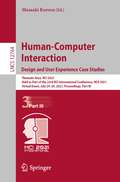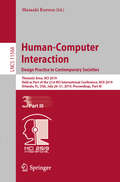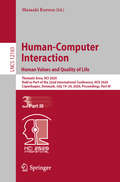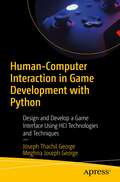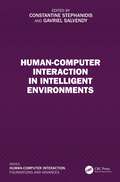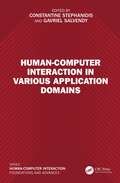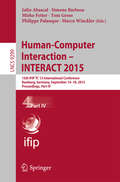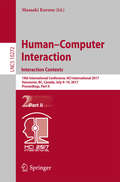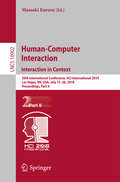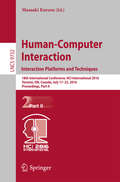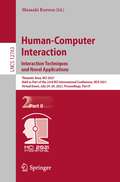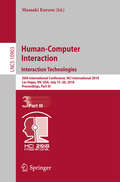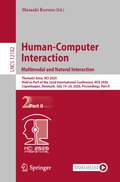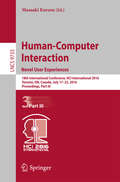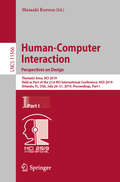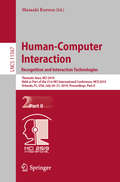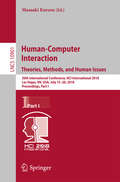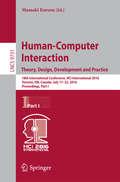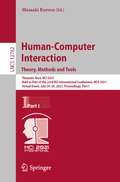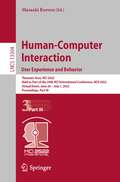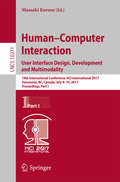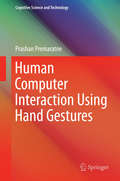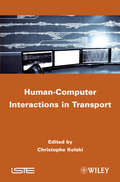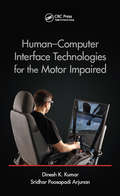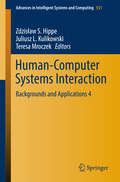- Table View
- List View
Human-Computer Interaction. Design and User Experience Case Studies: Thematic Area, HCI 2021, Held as Part of the 23rd HCI International Conference, HCII 2021, Virtual Event, July 24–29, 2021, Proceedings, Part III (Lecture Notes in Computer Science #12764)
by Masaaki KurosuThe three-volume set LNCS 12762, 12763, and 12764 constitutes the refereed proceedings of the Human Computer Interaction thematic area of the 23rd International Conference on Human-Computer Interaction, HCII 2021, which took place virtually in July 2021.The total of 1276 papers and 241 posters included in the 39 HCII 2021 proceedings volumes was carefully reviewed and selected from 5222 submissions. The 139 papers included in this HCI 2021 proceedings were organized in topical sections as follows: Part I, Theory, Methods and Tools: HCI theory, education and practice; UX evaluation methods, techniques and tools; emotional and persuasive design; and emotions and cognition in HCI Part II, Interaction Techniques and Novel Applications: Novel interaction techniques; human-robot interaction; digital wellbeing; and HCI in surgery Part III, Design and User Experience Case Studies: Design case studies; user experience and technology acceptance studies; and HCI, social distancing, information, communication and work
Human-Computer Interaction. Design Practice in Contemporary Societies: Thematic Area, HCI 2019, Held as Part of the 21st HCI International Conference, HCII 2019, Orlando, FL, USA, July 26–31, 2019, Proceedings, Part III (Lecture Notes in Computer Science #11568)
by Masaaki KurosuThe 3 volume-set LNCS 11566, 11567 + 11568 constitutes the refereed proceedings of the Human Computer Interaction thematic area of the 21st International Conference on Human-Computer Interaction, HCII 2019, which took place in Orlando, Florida, USA, in July 2019. A total of 1274 papers and 209 posters have been accepted for publication in the HCII 2019 proceedings from a total of 5029 submissions. The 125 papers included in this HCI 2019 proceedings were organized in topical sections as follows: Part I: design and evaluation methods and tools; redefining the human in HCI; emotional design, Kansei and aesthetics in HCI; and narrative, storytelling, discourse and dialogue. Part II: mobile interaction; facial expressions and emotions recognition; eye-gaze, gesture and motion-based interaction; and interaction in virtual and augmented reality. Part III: design for social challenges; design for culture and entertainment; design for intelligent urban environments; and design and evaluation case studies.
Human-Computer Interaction. Human Values and Quality of Life: Thematic Area, HCI 2020, Held as Part of the 22nd International Conference, HCII 2020, Copenhagen, Denmark, July 19–24, 2020, Proceedings, Part III (Lecture Notes in Computer Science #12183)
by Masaaki KurosuThe three-volume set LNCS 12181, 12182, and 12183 constitutes the refereed proceedings of the Human Computer Interaction thematic area of the 22nd International Conference on Human-Computer Interaction, HCII 2020, which took place in Copenhagen, Denmark, in July 2020.*A total of 1439 papers and 238 posters have been accepted for publication in the HCII 2020 proceedings from a total of 6326 submissions. The 145 papers included in these HCI 2020 proceedings were organized in topical sections as follows: Part I: design theory, methods and practice in HCI; understanding users; usability, user experience and quality; and images, visualization and aesthetics in HCI. Part II: gesture-based interaction; speech, voice, conversation and emotions; multimodal interaction; and human robot interaction. Part III: HCI for well-being and Eudaimonia; learning, culture and creativity; human values, ethics, transparency and trust; and HCI in complex environments.*The conference was held virtually due to the COVID-19 pandemic.
Human-Computer Interaction in Game Development with Python: Design and Develop a Game Interface Using HCI Technologies and Techniques
by Joseph Thachil George Meghna Joseph GeorgeDeepen your understanding of human-computer interaction (HCI) in game development and learn how to develop video games that grab players and don't let them go. This book explores HCI design in computer games to maximize collaborative and interactive functions. You'll first gain a basic introduction to fundamental concepts and practices of HCI before diving into the fundamental concepts of game interface design and technology. You'll learn how to design a gaming interface through practical examples using Python. This is followed by a brief look at how HCI can offer immersive gaming experiences for players and a review of key elements such as interface, usability, user-centered design, and user interface in terms of efficacy. You will also learn how to implement usability aspects in gaming interfaces with examples using Python. Additionally, the book discusses major challenges that game publishers and developers face, and how they can be resolved using HCI techniques. The question of playability is reviewed throughout the game production process. After working through this book's practical examples, you'll have the knowledge required to begin developing compelling, can't-put-the-controller down games of your own. What You'll LearnMaster HCI tools and methodologies Understand the concept of HCI strategies in the game development cycleDevelop a game in Python using the HCI approachUtilize gamification techniques in Human-Computer InteractionGrasp concepts of usability, user experience and user-centered design processes and their application Who This Book Is ForProgrammers, engineers, and students interested in creating and implementing computer games using HCI technologies. Prior experience with game development is recommended.
Human-Computer Interaction in Intelligent Environments: 5th International Conference, Uahci 2009, Held As Part Of Hci International 2009, San Diego, Ca, Usa, July 19-24, 2009. Proceedings, Part Ii (Lecture Notes In Computer Science Ser. #5615)
by Gavriel Salvendy Constantine StephanidisThis book offers readers a holistic understanding of intelligent environments, encompassingtheir definition, design, interaction paradigms, the role of Artificial Intelligence (AI), and theassociated broader philosophical and procedural aspects. Elaborates on AI research and the creation of intelligent environments. Zooms in on designing interactions with the IoT, intelligent agents and robots. Discusses overarching topics for the design of intelligent environments, including user interface adaptation, design for all, sustainability, cybersecurity, privacy and trust. Provides insights into the intricacies of various intelligent environment contexts, such as in automotive, urban interfaces, smart cities and beyond. This book has been written for individuals interested in Human-Computer Interaction research and applications.
Human-Computer Interaction in Various Application Domains
by Gavriel Salvendy Constantine StephanidisHuman-Computer Interaction (HCI) is a multidisciplinary research and applied field targeted to studying people interacting with information technology and designing usable and efficient systems for them. This book outlines the state‑of‑the‑art of HCI research in the respective domain such as health, games, transportation, industry, and entertainment.This book Bridges the gap between theory and practice by presenting how to apply HCI methods and tools in specific domains. Offers concrete examples of HCI use in real-world situations. Presents case-specific best practices, tips, and tricks. Includes chapters that are well-studied and purposefully selected, representing important theoretical, practical, and research areas in HCI. Includes domains ranging from the roots and the classic approaches of human-computer interaction to contemporary advancements. This book is a fascinating read for individuals interested in Human-Computer Interaction research and applications.
Human-Computer Interaction - INTERACT 2015
by Marco Winckler Philippe Palanque Tom Gross Mirko Fetter Simone Barbosa Julio AbascalThe four-volume set LNCS 9296-9299 constitutes the refereed proceedings of the 15th IFIP TC13 International Conference on Human-Computer Interaction, INTERACT 2015, held in Bamberg, Germany, in September 2015. The 41 papers included in the first volume are organized in topical sections on accessibility; accessible interfaces for blind people; accessible interfaces for older adults; affective HCI and emotions and motivational aspects; alternative input; alternative input devices for people with disabilities; interfaces for cognitive support; brain-computer interaction; cognitive factors.
Human-Computer Interaction. Interaction Contexts
by Masaaki KurosuThe five-volume set LNCS 8004--8008 constitutes the refereed proceedings of the 15th International Conference on Human-Computer Interaction, HCII 2013, held in Las Vegas, NV, USA in July 2013. The total of 1666 papers and 303 posters presented at the HCII 2013 conferences was carefully reviewed and selected from 5210 submissions. These papers address the latest research and development efforts and highlight the human aspects of design and use of computing systems. The papers accepted for presentation thoroughly cover the entire field of human-computer Interaction, addressing major advances in knowledge and effective use of computers in a variety of application areas. This volume contains papers in the thematic area of human-computer interaction, addressing the following major topics: identity, privacy and trust; user studies; interaction for society and community; HCI for business and innovation.
Human-Computer Interaction. Interaction in Context: 20th International Conference, HCI International 2018, Las Vegas, NV, USA, July 15–20, 2018, Proceedings, Part II (Lecture Notes in Computer Science #10902)
by Masaaki KurosuThe 3 volume-set LNCS 10901, 10902 + 10903 constitutes the refereed proceedings of the 20th International Conference on Human-Computer Interaction, HCI 2018, which took place in Las Vegas, Nevada, in July 2018. The total of 1171 papers and 160 posters included in the 30 HCII 2018 proceedings volumes was carefully reviewed and selected from 4346 submissions. HCI 2018 includes a total of 145 papers; they were organized in topical sections named: Part I: HCI theories, methods and tools; perception and psychological issues in HCI; emotion and attention recognition; security, privacy and ethics in HCI. Part II: HCI in medicine; HCI for health and wellbeing; HCI in cultural heritage; HCI in complex environments; mobile and wearable HCI. Part III: input techniques and devices; speech-based interfaces and chatbots; gesture, motion and eye-tracking based interaction; games and gamification.
Human-Computer Interaction. Interaction Platforms and Techniques
by Masaaki KurosuThe 3-volume set LNCS 9731, 9732, and 9733 constitutes the refereed proceedings of the 18th International Conference on Human-Computer Interaction, HCII 2016, held in Toronto, ON, Canada, in July 2016. The total of 1287 papers presented at the HCII 2016 conferences was carefully reviewed and selected from 4354 submissions. The papers thoroughly cover the entire field of Human-Computer Interaction, addressing major advances in knowledge and effective use of computers in a variety of application areas. The volumes constituting the full 27-volume set of the conference proceedings.
Human-Computer Interaction. Interaction Techniques and Novel Applications: Thematic Area, HCI 2021, Held as Part of the 23rd HCI International Conference, HCII 2021, Virtual Event, July 24–29, 2021, Proceedings, Part II (Lecture Notes in Computer Science #12763)
by Masaaki KurosuThe three-volume set LNCS 12762, 12763, and 12764 constitutes the refereed proceedings of the Human Computer Interaction thematic area of the 23rd International Conference on Human-Computer Interaction, HCII 2021, which took place virtually in July 2021.The total of 1276 papers and 241 posters included in the 39 HCII 2021 proceedings volumes was carefully reviewed and selected from 5222 submissions. The 139 papers included in this HCI 2021 proceedings were organized in topical sections as follows: Part I, Theory, Methods and Tools: HCI theory, education and practice; UX evaluation methods, techniques and tools; emotional and persuasive design; and emotions and cognition in HCI Part II, Interaction Techniques and Novel Applications: Novel interaction techniques; human-robot interaction; digital wellbeing; and HCI in surgery Part III, Design and User Experience Case Studies: Design case studies; user experience and technology acceptance studies; and HCI, social distancing, information, communication and work
Human-Computer Interaction. Interaction Technologies: 20th International Conference, HCI International 2018, Las Vegas, NV, USA, July 15–20, 2018, Proceedings, Part III (Lecture Notes in Computer Science #10903)
by Masaaki KurosuThe 3 volume-set LNCS 10901, 10902 + 10903 constitutes the refereed proceedings of the 20th International Conference on Human-Computer Interaction, HCI 2018, which took place in Las Vegas, Nevada, in July 2018. The total of 1171 papers and 160 posters included in the 30 HCII 2018 proceedings volumes was carefully reviewed and selected from 4346 submissions. HCI 2018 includes a total of 145 papers; they were organized in topical sections named: Part I: HCI theories, methods and tools; perception and psychological issues in HCI; emotion and attention recognition; security, privacy and ethics in HCI. Part II: HCI in medicine; HCI for health and wellbeing; HCI in cultural heritage; HCI in complex environments; mobile and wearable HCI. Part III: input techniques and devices; speech-based interfaces and chatbots; gesture, motion and eye-tracking based interaction; games and gamification.
Human-Computer Interaction. Multimodal and Natural Interaction: Thematic Area, HCI 2020, Held as Part of the 22nd International Conference, HCII 2020, Copenhagen, Denmark, July 19–24, 2020, Proceedings, Part II (Lecture Notes in Computer Science #12182)
by Masaaki KurosuThe three-volume set LNCS 12181, 12182, and 12183 constitutes the refereed proceedings of the Human Computer Interaction thematic area of the 22nd International Conference on Human-Computer Interaction, HCII 2020, which took place in Copenhagen, Denmark, in July 2020.*A total of 1439 papers and 238 posters have been accepted for publication in the HCII 2020 proceedings from a total of 6326 submissions. The 145 papers included in these HCI 2020 proceedings were organized in topical sections as follows: Part I: design theory, methods and practice in HCI; understanding users; usability, user experience and quality; and images, visualization and aesthetics in HCI. Part II: gesture-based interaction; speech, voice, conversation and emotions; multimodal interaction; and human robot interaction. Part III: HCI for well-being and Eudaimonia; learning, culture and creativity; human values, ethics, transparency and trust; and HCI in complex environments.*The conference was held virtually due to the COVID-19 pandemic.
Human-Computer Interaction. Novel User Experiences
by Masaaki KurosuThe 3-volume set LNCS 9731, 9732, and 9733 constitutes the refereed proceedings of the 18th International Conference on Human-Computer Interaction, HCII 2016, held in Toronto, ON, Canada, in July 2016. The total of 1287 papers presented at the HCII 2016 conferences was carefully reviewed and selected from 4354 submissions. The papers thoroughly cover the entire field of Human-Computer Interaction, addressing major advances in knowledge and effective use of computers in a variety of application areas. The volumes constituting the full 27-volume set of the conference proceedings.
Human-Computer Interaction. Perspectives on Design: Thematic Area, HCI 2019, Held as Part of the 21st HCI International Conference, HCII 2019, Orlando, FL, USA, July 26–31, 2019, Proceedings, Part I (Lecture Notes in Computer Science #11566)
by Masaaki KurosuThe 3 volume-set LNCS 11566, 11567 + 11568 constitutes the refereed proceedings of the Human Computer Interaction thematic area of the 21st International Conference on Human-Computer Interaction, HCII 2019, which took place in Orlando, Florida, USA, in July 2019. A total of 1274 papers and 209 posters have been accepted for publication in the HCII 2019 proceedings from a total of 5029 submissions. The 125 papers included in this HCI 2019 proceedings were organized in topical sections as follows: Part I: design and evaluation methods and tools; redefining the human in HCI; emotional design, Kansei and aesthetics in HCI; and narrative, storytelling, discourse and dialogue. Part II: mobile interaction; facial expressions and emotions recognition; eye-gaze, gesture and motion-based interaction; and interaction in virtual and augmented reality. Part III: design for social challenges; design for culture and entertainment; design for intelligent urban environments; and design and evaluation case studies.
Human-Computer Interaction. Recognition and Interaction Technologies: Thematic Area, HCI 2019, Held as Part of the 21st HCI International Conference, HCII 2019, Orlando, FL, USA, July 26–31, 2019, Proceedings, Part II (Lecture Notes in Computer Science #11567)
by Masaaki KurosuThe 3 volume-set LNCS 11566, 11567 + 11568 constitutes the refereed proceedings of the Human Computer Interaction thematic area of the 21st International Conference on Human-Computer Interaction, HCII 2019, which took place in Orlando, Florida, USA, in July 2019. A total of 1274 papers and 209 posters have been accepted for publication in the HCII 2019 proceedings from a total of 5029 submissions. The 125 papers included in this HCI 2019 proceedings were organized in topical sections as follows: Part I: design and evaluation methods and tools; redefining the human in HCI; emotional design, Kansei and aesthetics in HCI; and narrative, storytelling, discourse and dialogue. Part II: mobile interaction; facial expressions and emotions recognition; eye-gaze, gesture and motion-based interaction; and interaction in virtual and augmented reality. Part III: design for social challenges; design for culture and entertainment; design for intelligent urban environments; and design and evaluation case studies.
Human-Computer Interaction. Theories, Methods, and Human Issues: 20th International Conference, HCI International 2018, Las Vegas, NV, USA, July 15–20, 2018, Proceedings, Part I (Lecture Notes in Computer Science #10901)
by Masaaki KurosuThe 3 volume-set LNCS 10901, 10902 + 10903 constitutes the refereed proceedings of the 20th International Conference on Human-Computer Interaction, HCI 2018, which took place in Las Vegas, Nevada, in July 2018. The total of 1171 papers and 160 posters included in the 30 HCII 2018 proceedings volumes was carefully reviewed and selected from 4346 submissions. HCI 2018 includes a total of 145 papers; they were organized in topical sections named: Part I: HCI theories, methods and tools; perception and psychological issues in HCI; emotion and attention recognition; security, privacy and ethics in HCI. Part II: HCI in medicine; HCI for health and wellbeing; HCI in cultural heritage; HCI in complex environments; mobile and wearable HCI. Part III: input techniques and devices; speech-based interfaces and chatbots; gesture, motion and eye-tracking based interaction; games and gamification.
Human-Computer Interaction. Theory, Design, Development and Practice
by Masaaki KurosuThe 3-volume set LNCS 9731, 9732, and 9733 constitutes the refereed proceedings of the 18th International Conference on Human-Computer Interaction, HCII 2016, held in Toronto, ON, Canada, in July 2016. The total of 1287 papers presented at the HCII 2016 conferences was carefully reviewed and selected from 4354 submissions. The papers thoroughly cover the entire field of Human-Computer Interaction, addressing major advances in knowledge and effective use of computers in a variety of application areas. The volumes constituting the full 27-volume set of the conference proceedings are listed on pages VII and VIII.
Human-Computer Interaction. Theory, Methods and Tools: Thematic Area, HCI 2021, Held as Part of the 23rd HCI International Conference, HCII 2021, Virtual Event, July 24–29, 2021, Proceedings, Part I (Lecture Notes in Computer Science #12762)
by Masaaki KurosuThe three-volume set LNCS 12762, 12763, and 12764 constitutes the refereed proceedings of the Human Computer Interaction thematic area of the 23rd International Conference on Human-Computer Interaction, HCII 2021, which took place virtually in July 2021.The total of 1276 papers and 241 posters included in the 39 HCII 2021 proceedings volumes was carefully reviewed and selected from 5222 submissions. The 139 papers included in this HCI 2021 proceedings were organized in topical sections as follows: Part I, Theory, Methods and Tools: HCI theory, education and practice; UX evaluation methods, techniques and tools; emotional and persuasive design; and emotions and cognition in HCI Part II, Interaction Techniques and Novel Applications: Novel interaction techniques; human-robot interaction; digital wellbeing; and HCI in surgery Part III, Design and User Experience Case Studies: Design case studies; user experience and technology acceptance studies; and HCI, social distancing, information, communication and work
Human-Computer Interaction. User Experience and Behavior: Thematic Area, HCI 2022, Held as Part of the 24th HCI International Conference, HCII 2022, Virtual Event, June 26 – July 1, 2022, Proceedings, Part III (Lecture Notes in Computer Science #13304)
by Masaaki KurosuThe three-volume set LNCS 13302, 13303 and 13304 constitutes the refereed proceedings of the Human Computer Interaction thematic area of the 24th International Conference on Human-Computer Interaction, HCII 2022, which took place virtually in June-July 2022. The 132 papers included in this HCI 2022 proceedings were organized in topical sections as follows: Part I: Theoretical and Multidisciplinary Approaches in HCI; Design and Evaluation Methods, Techniques and Tools; Emotions and Design; and Children-Computer Interaction, Part II: Novel Interaction Devices, Methods and Techniques; Text, Speech and Image Processing in HCI; Emotion and Physiological Reactions Recognition; and Human-Robot Interaction, Part III: Design and User Experience Case Studies, Persuasive Design and Behavioral Change; and Interacting with Chatbots and Virtual Agents.
Human-Computer Interaction. User Interface Design, Development and Multimodality
by Masaaki KurosuThe two-volume set LNCS 10271 and 10272 constitutes the refereed proceedings of the 19th International Conference on Human-Computer Interaction, HCII 2017, held in Vancouver, BC, Canada, in July 2017. The total of 1228 papers presented at the 15 colocated HCII 2017 conferences was carefully reviewed and selected from 4340 submissions. The papers address the latest research and development efforts and highlight the human aspects of design and use of computing systems. They cover the entire field of Human-Computer Interaction, addressing major advances in knowledge and effective use of computers in a variety of application areas. The papers included in this volume cover the following topics: HCI theory and education; HCI, innovation and technology acceptance; interaction design and evaluation methods; user interface development; methods, tools, and architectures; multimodal interaction; and emotions in HCI.
Human Computer Interaction Using Hand Gestures
by Prashan PremaratneHuman computer interaction (HCI) plays a vital role in bridging the 'Digital Divide', bringing people closer to consumer electronics control in the 'lounge'. Keyboards and mouse or remotes do alienate old and new generations alike from control interfaces. Hand Gesture Recognition systems bring hope of connecting people with machines in a natural way. This will lead to consumers being able to use their hands naturally to communicate with any electronic equipment in their 'lounge. ' This monograph will include the state of the art hand gesture recognition approaches and how they evolved from their inception. The author would also detail his research in this area for the past 8 years and how the future might turn out to be using HCI. This monograph will serve as a valuable guide for researchers (who would endeavour into) in the world of HCI.
Human-Computer Interactions in Transport
by Christophe KolskiThe human-computer interactions are more and more present in our everyday life, and lead to many conceptual and methodological problems for the designers and evaluators of interactive systems. This book is about Human-Computer Interaction in Transport domain, in which the traveler becomes a user of information systems, particularly before and during the travel(s). This book will focus on traveler information and personalized systems, using a human-centered design approach.
Human-Computer Interface Technologies for the Motor Impaired (Rehabilitation Science In Practice Ser.)
by Dinesh K. Kumar Sridhar Poosapadi ArjunanHuman Computer Interface Technologies for the Motor Impaired examines both the technical and social aspects of human computer interface (HCI). Written by world-class academic experts committed to improving HCI technologies for people with disabilities, this all-inclusive book explores the latest research, and offers insight into the current limitat
Human-Computer Systems Interaction
by Zdzisław S. Hippe Juliusz L. Kulikowski Teresa MroczekFor the last decades, as the computer technology has been developing, the importance of human-computer systems interaction problems was growing. This is not only because the computer systems performance characteristics have been im-proved but also due to the growing number of computer users and of their expectations about general computer systems capabilities as universal tools for human work and life facilitation. The early technological problems of man-computer information exchange - which led to a progress in computer programming languages and input/output devices construction - have been step by step dominated by the more general ones of human interaction with-and-through computer systems, shortly denoted as H-CSI problems. The interest of scientists and of any sort specialists to the H-CSI problems is very high as it follows from an increasing number of scientific conferences and publications devoted to these topics. The present book contains selected papers concerning various aspects of H-CSI. They have been grouped into five Parts: I. General H-CSI problems (7 papers), II. Disabled persons helping and medical H-CSI applications (9 papers), III. Psychological and linguistic H-CSI aspects (9 papers), IV. Robots and training systems (8 papers), V. Various H-CSI applications (11 papers).
